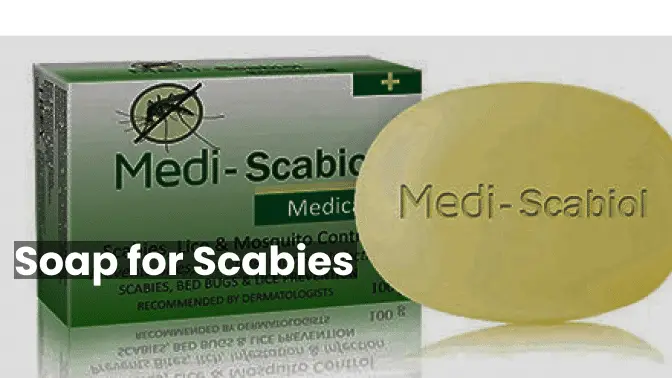Scabies is a contagious skin infection caused by the microscopic mite Sarcoptes scabies. It is transmitted through skin-to-skin contact with an infected person and is commonly found in crowded and unsanitary living conditions such as prisons, nursing homes, and refugee camps.
Scabies is a common health problem, affecting millions of people worldwide every year. Fortunately, there are many treatments available for scabies, including the use of soap.
The symptoms of scabies can vary from person to person, but common signs include intense itching, a pimple-like rash, and small burrow tracks on the skin. The itching can be particularly severe at night and can lead to sleep disturbance and psychological distress.
The rash usually appears on the folds of the skin, such as between the fingers, on the wrists, and in the armpits. In severe cases, scabies can lead to complications such as secondary bacterial infections.
Read Also: Ivermectin to treat parasitic Infections: What are parasitic Infections?
Treatment for Scabies
One of the most effective treatments for scabies is the use of soap. Soap works by killing the mites and their eggs, which can help to stop the spread of the infection. There are many different types of soap that can be used to treat scabies, including medicated soaps, sulfur soaps, and neem oil soaps.
Medicated soaps contain chemicals such as permethrin or benzyl benzoate, which are toxic to the scabies mite. These soaps are usually available over-the-counter and are easy to use.
Simply lather the soap on the affected area and leave it on for a few minutes before rinsing it off. Medicated soaps are usually used in conjunction with other treatments such as oral medication or topical creams.
Sulfur soaps are another effective treatment for scabies. Sulfur is a natural element that has been used for centuries to treat a variety of skin conditions.
Sulfur soaps work by killing the mites and their eggs and also help to reduce the itching associated with scabies. Sulfur soaps can be used in the same way as other soaps for scabies.
Some common soaps used to help treat scabies include:
- Permethrin soap: Permethrin is a type of insecticide that is used to kill scabies mites. Permethrin soap is usually applied to the affected areas of the body and left on for several minutes before being rinsed off.
- Benzyl benzoate soap: Benzyl benzoate is another medication used to kill scabies mites. Benzyl benzoate soap is applied in a similar manner to permethrin soap.
- Sulfur soap: Sulfur is an effective treatment for scabies because it can kill mites and also help to reduce inflammation and itching. Sulfur soap is typically used in combination with other scabies medications.
- Tea tree oil soap: Tea tree oil has antifungal, antibacterial, and anti-inflammatory properties that may help to kill the mites and soothe the skin.
- Neem soap: Neem has antibacterial and antifungal properties that may help to kill mites and reduce itching.
- Lavender soap: Lavender has anti-inflammatory and antimicrobial properties that may help to soothe the skin and reduce itching.
Other ways that can help you from Scabies
Here are some other ways that can help you prevent and manage scabies:
- Avoid close contact with people who have scabies. Scabies is highly contagious and spreads through close skin-to-skin contact.
- Wash all bedding, clothing, and towels in hot water and dry them on high heat. This will help to kill any mites or eggs that may be on the fabric.
- Vacuum carpets, furniture, and floors regularly to remove any mites or eggs that may be present.
- Use a disinfectant spray or wipe to clean surfaces in your home, especially those that are frequently touched.
- Treat all family members, close contacts, and pets who may have been exposed to scabies, even if they do not show symptoms.
- Apply a medicated cream or lotion prescribed by a doctor. These products contain ingredients that kill the mites and their eggs.
- Avoid scratching the affected areas, as this can lead to a secondary bacterial infection.
- Take oral antihistamines or use over-the-counter anti-itch creams to relieve itching and discomfort.
- Follow your doctor’s instructions for treatment and be sure to complete the full course of medication, even if symptoms improve.
Remember, scabies is a treatable condition, and with prompt and appropriate treatment, most people recover without complications. If you have any concerns about scabies or think you may have been exposed, talk to your healthcare provider
It is important to note that using over-the-counter soaps or remedies alone may not be sufficient to treat scabies, and it is recommended to consult a healthcare provider for appropriate diagnosis and treatment.
Conclusion
[bwla_faq single=”1″ fpid=”35791″/]


